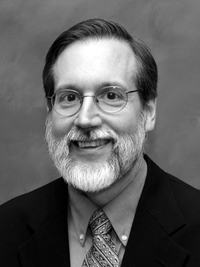 |
Thomas Tape, M.D. |
But that’s not the only aspect of the crisis that drives up costs, said Thomas Tape, M.D., chief of general internal medicine at UNMC and governor of the Nebraska chapter of the American College of Physicians
“The dwindling number of primary care physicians and decreasing number of medical students choosing primary care as a career just might overshadow everything else,” Dr. Tape said.
Without a regular doctor, people turn to the emergency rooms for routine care.
“They end up in the ER for a sore throat, urinary tract infection or sprained ankle, things that a primary care doctor would normally handle in the office,” Dr. Tape said.
This in turn drives up the cost of health care because an emergency room visit may cost 10 times as much as for a primary care office visit. Also, patients without health insurance who use the emergency room often are unable to pay the bill. The hospital must subsidize the charges with higher prices for everybody else, he said.
So why are fewer medical students choosing primary care as a career?
The demands of being a primary care physician today are often overwhelming.
“Today’s primary care physicians struggle to keep up with the swelling tide of patients and paperwork,” Dr. Tape said. “They also face inadequate reimbursement from Medicare and Medicaid, which impacts how well they can meet the costs of running a clinic, support their families and pay their student loans.”
Being one of only a few physicians in a small primary care practice in North Platte proved to be overwhelming for Matt Johnson, M.D. The UNMC graduate joined the practice in 2005, looking forward to building his career and raising a family in the small town.
He quickly became overwhelmed, working long hours and moonlighting on the weekends at hospitals in Omaha to provide for his family and meet his student loan obligations. The excitement he once felt at starting a new career in a small town, where he could raise his son and daughter, was replaced with sheer exhaustion.
Dr. Johnson is now back at UNMC studying cardiology, a specialty he has always had interest in. He hopes that cardiology will allow him a more flexible salary that will not only allow him to raise his family but pay off his student loans.
To address this issue, the American College of Physicians is working with Congress to introduce legislation in the form of the Preserving Patient Access to Primary Care Act (H.R. 7192).
The bill proposes easing the financial burden on primary care physicians through several different pathways that would have their medical education expenses paid for or reduced through scholarships or repayment of debt. In return, the physician would have a service obligation in primary care to fulfill.
While Nebraska does offer scholarships and loan repayment programs these are targeted towards rural areas and require local matching funds. More support for primary care will be needed to meet the demand for patient care across the state.
|
|
“We need to redesign the primary care practice so it is something that people want to do and will be financially feasible for them,” Dr. Tape said.
The Patient Centered Medical Home concept, which is also promoted by the bill being submitted to Congress, would do just that. A physician practicing in a “medical home” can practice medicine as it should be practiced, Dr. Tape said.
In this concept, each patient would have a personal physician who works with a health care team to provide comprehensive care. The concept also involves the patient as a partner in working with the team to enhance wellness. Medical homes would monitor the progress of their patients and remind them when recommended care is due.
Medicare plans to fund demonstrations of the medical home concept in certain regions of the country next year, Dr. Tape said.
“The medical home approach is expected to improve health as well as save money,” he said. “The Patient-Centered Medical Home is the current best hope for saving primary care.”